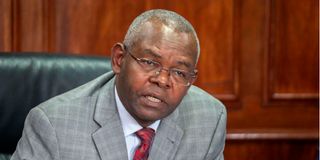
The Central Bank of Kenya (CBK) headquarters in Nairobi.
The Central Bank of Kenya (CBK) is grappling with an ageing workforce, with more than a third of its staff approaching retirement age.
Of the bank's 1,311 employees, 455 are between the ages of 51 and 60, and the majority of senior staff will soon be retiring.
This means that around 34.7 percent of the workforce is approaching retirement age.
According to documents presented to the Senate Committee on National Cohesion, Equal Opportunities and Regional Integration, the situation could be even worse in the coming years, with another 26.4 percent of the workforce between the ages of 41 and 50.
The Kikuyu and Kalenjin communities make up almost half of CBK staff.
Appearing before the committee chaired by Marsabit Senator Mohamed Chute on Tuesday, CBK Governor Kamau Thugge admitted that the bank was facing a crisis but said plans had been put in place to revitalise the workforce.
He told the committee that the fact that more than 60 percent of staff are over 40 years old indicates an experienced workforce, which is important for knowledge transfer and business continuity.

Central Bank of Kenya Governor Kamau Thugge.
"To address the issue of an ageing workforce in the bank, we have put in place a succession planning process. We intend to roll out a mentoring programme as we continue to employ a younger workforce," says Mr Thugge.
The issue of an ageing workforce is widespread in the public sector.
As of the fiscal year ending June 2021, the civil service workforce stood at 923,100.
However, a significant proportion of the workforce is approaching the mandatory retirement age, with the government payroll for June 2024 already showing that 39,360 civil servants are expected to retire soon.
Some 7,477 civil servants have already retired between September 13, 2023 and June 30, 2024.
Approaching retirement
Data from the Public Service Commission (PSC) shows that there were more than 4,500 civil servants aged 60 and over in December 2023.
Another 25,879 from 520 government agencies were aged between 56 and 60. The PSC's 2016 Human Resources Policies and Procedures Manual sets the mandatory retirement age for civil servants at 60 years.
Overall, those in or approaching retirement accounted for 12 per cent of the 25,318 civil servants at the time.
In December 2023, there were at least 2,573 staff aged over 60 in the higher education institutions. There were 3,362 between the ages of 56 and 60.
State enterprises, according to PSC data, had the second highest number with 1,081. Those turning 60 within the next three years numbered 10,889.
At the same time, two communities account for almost half of the workforce, leaving the remaining 44 ethnic communities to scramble for the rest.
The two dominant communities, Kikuyu and Kalenjin, account for 583 of the bank's 1,311 staff, with the former accounting for 325 and the latter 258.
Luo (139), Kamba (123), Luhya (113), Kisii (90), Meru (66), Maasai (31), Taita (30), Mijikenda (25), Embu (17), Kenyan Somali (13) and Borana (7).
Kuria, Mbeere and Turkana have five staff each, while Ilchamus, Kenya Arabs, Pokomo, Swahili, Taveta, Teso and Tharaka have four staff each at the CBK.

Senator Chute Mohamed Said during a session at the Bunge Tower Nairobi on Tuesday, January 28, 2025.
The committee wondered why the two communities were taking up the bulk of the jobs, which went against the spirit of wider ethnic inclusion.
Senator Chute pressed Mr Thugge on why CBK had failed to consider ethnic composition in the distribution of jobs, adding that even internships were still given to the Kalenjin community.
"From your presentation, the Kikuyu and the Kalenjin occupy almost 50 per cent of the jobs in CBK. You have also given internship positions to the Kalenjin community, leaving the rest of Kenyans behind. This is unacceptable," said Mr Chute.
The committee urged the bank to ensure that it replaces the soon-to-be-retired staff with people from communities that are under-represented at the institution.
In his response to the committee, the CBK chief, while admitting that the two dominant communities had taken up almost half of all available positions, said he would ensure that the 455 people aged between 51 and 60 were replaced by people from other communities.
"I acknowledge that the positions have been skewed in favour of only two dominant communities to the exclusion of other communities. We will address the employment of other communities in subsequent recruitment processes," Mr Thugge said.
He noted that in line with Article 232 of the Constitution and the Bank's core value of diversity and inclusiveness, the Bank has recruited staff from 31 ethnic backgrounds, representing 67 per cent of the 46 ethnic communities in Kenya.
Busia Senator Okiya Omtatah and his Makueni counterpart Dan Maanzo questioned the ethnic composition of the management of CBK's seven branches in Kisumu, Kisii, Mombasa, Nyeri, Eldoret and Nakuru.
In addition, the two MPs wanted to know who was promoted, who was recruited outside the advertised positions and the criteria used to promote some internally while others were recruited externally.
"We want to know the distribution of CBK branch heads and their ethnic composition. How is recruitment done in CBK?" asked Mr Omtatah.
In response, Mr Thugge told the committee that CBK would provide a list of the heads of the seven branches and the list of promotions in the last 16 months.
He also stated that the bank will work with local authorities and the National Council for People with Disabilities.
He explained that the recruitment process is robust and that there are six panelists, including external human resources personnel, who interview the shortlisted candidates for various positions within the bank.









